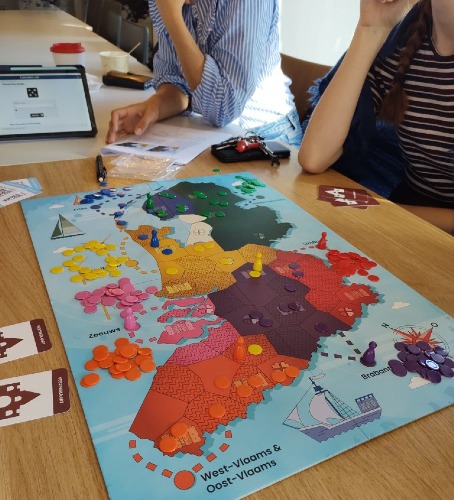Board game Streektaalstrijd: Conquer the Netherlands and Flanders with regional languages

PhD candidates Raoul Buurke , Hedwig Sekeres , and Lourens Visser from the Faculty of Arts of the University of Groningen have developed a board game: Streektaalstrijd. Players conquer the language area of the opponent by answering questions about linguistics and the regional languages spoken in the Netherlands and Flanders. On February 26, Prof Martijn Wieling , initiator of the game, will present a copy of the game to Groningen Commissioner of the King René Paas.
Streektaalstrijd consists of a geographical map of the Netherlands and Flanders, divided into seven colored areas. Each color represents a regional language still spoken: Frisian, Low Saxon, Dutch, Zeelandic, Limburgish, West and East Flemish, and Brabantian. The game is played with two to seven players. Each player represents a language area. Players conquer the language area of the opponent by answering questions about the regional languages spoken in the Netherlands and Flanders.
Great variation within language areas
While playing, players learn various special words from the different regional languages. They also learn more about the great variation within language areas, as there are numerous variations within Low Saxon alone, such as Gronings, Drents, Twents, and Veluws. And those variants also have sub-variants.
In addition, players can listen to audio fragments via the accompanying website and guess from which speech area the fragment originates. This way, they learn about pronunciation and gain knowledge about linguistics in general, for example, about the Indo-European, the language family to which all seven language areas belong.
Removing prejudices
Linguist Raoul Buurke: "We want to teach people something about linguistics and the variety of regional languages in the Netherlands and Flanders in a playful way. But we also want to remove prejudices about people who speak regional languages. They are sometimes thought to be blunt or unintelligent. Whereas that has nothing to do with speaking a regional language."
Buurke and his colleagues believe that regional languages are worth speaking. "It is important, living cultural heritage, which makes all those different variants of regional languages very valuable.”
The linguists mainly research Low Saxon languages. Therefore, they collaborated with scientists from all over the Netherlands and Flanders for the development of the board game. "But we also involved speakers of the different languages," says Buurke.
Sales points
The game has been available since the beginning of this year in limited edition at various locations in the Netherlands, including the UG’s University Shop. The game was made with the support of the Royal Netherlands Academy of Arts and Sciences (KNAW) and contributions from various provinces and regional language organizations.
More news
-
07 January 2026
How music is helping to revive the Gronings dialect
-
16 December 2025
How AI can help people with language impairments find their speech
-
18 November 2025
What about the wife beater? How language reinforces harmful ideas
